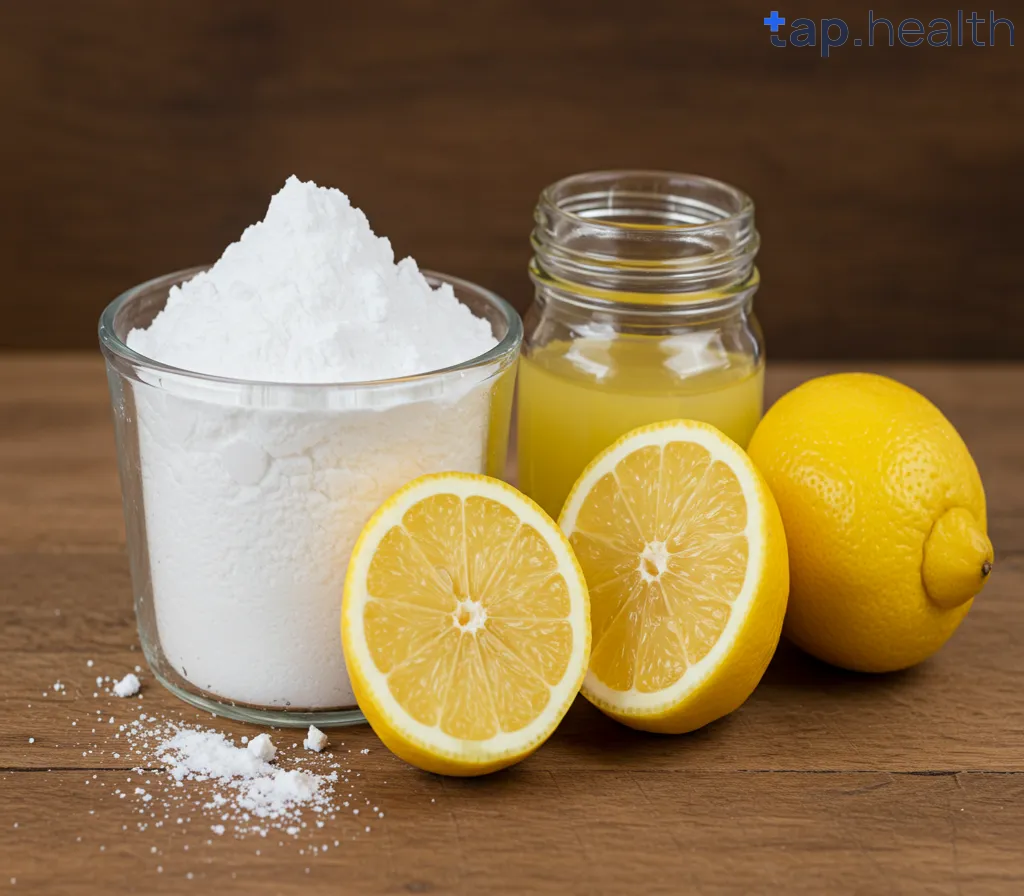Baking soda and lemon juice are two common household ingredients that have been used for centuries in various cultures for both culinary and health purposes. Individually, these two ingredients boast impressive benefits, but when combined, they create a powerful reaction. So, what happens when baking soda is mixed with lemon juice, and why should you care?
In this article, we’ll dive into the science behind this mixture, explore its potential health benefits, and explain how you can use it effectively in your daily routine. Whether you’re curious about how it impacts your skin, your digestive system, or your overall health, this guide will cover all the essential details you need to know.
The Science Behind Baking Soda and Lemon Juice
What Happens When Baking Soda and Lemon Juice Are Combined?
When you mix baking soda (sodium bicarbonate) with lemon juice (which contains citric acid), a chemical reaction occurs. The acid in the lemon juice reacts with the alkaline properties of the baking soda, resulting in the production of carbon dioxide gas. This is why you often see bubbles or fizzing when the two substances are combined.
- Chemical Reaction: The combination of citric acid and sodium bicarbonate creates carbon dioxide (CO2), which is released as bubbles. This is a basic acid-base reaction, where the acid (citric acid) neutralizes the base (baking soda).
- What It Means for You: The fizzing reaction is harmless and actually plays a role in some of the uses of this combination. It can help mix ingredients more efficiently, but its effects are most noticeable when the mixture is used for cleaning or certain health remedies.
Health Benefits of Mixing Baking Soda with Lemon Juice
While the fizzy reaction is fun to watch, it’s the health benefits of this combination that people are most interested in. Here are some potential benefits of mixing baking soda with lemon juice:
1. Promotes Healthy Digestion
Both baking soda and lemon juice are often used to help with digestion. The combination can help balance stomach acid, alleviate indigestion, and reduce symptoms of acid reflux. Here’s how:
- Baking Soda: As an alkaline substance, it can neutralize stomach acid, helping to relieve symptoms like heartburn and acid reflux.
- Lemon Juice: Despite being acidic in nature, lemon juice is considered alkaline-forming in the body. This helps balance the body’s pH levels, supporting digestion and promoting healthy stomach function.
How to Use for Digestion:
- Mix 1/2 teaspoon of baking soda with the juice of half a lemon in a glass of water. Drink it first thing in the morning to help with digestion and alkalize your body.
2. Boosts Immunity
Lemon juice is packed with vitamin C, a powerful antioxidant that helps to boost your immune system. When combined with the alkaline properties of baking soda, this mixture can provide your body with a natural defense boost, potentially helping you fight off illnesses.
- Vitamin C helps in the production of white blood cells, which are essential for fighting infections and viruses.
How to Use for Immunity:
- Mix the juice of one lemon with 1/4 teaspoon of baking soda in a glass of water. Drink this daily to support your immune system.
3. Improves Skin Health
The combination of baking soda and lemon juice is often touted as a natural remedy for skin issues like acne, blemishes, and dark spots. The exfoliating nature of baking soda, combined with the brightening effect of lemon juice, can help improve the overall appearance of your skin.
- Baking Soda: Acts as a gentle exfoliant, removing dead skin cells and unclogging pores, which can reduce acne and pimples.
- Lemon Juice: Contains citric acid, which helps brighten the skin and reduce the appearance of dark spots, giving your complexion a natural glow.
How to Use for Skin Health:
- Create a paste by mixing 1 teaspoon of baking soda with fresh lemon juice and apply it to your face in a gentle circular motion. Leave it on for 5–10 minutes, then rinse with warm water. Use this mask once or twice a week for glowing, clearer skin.
4. Detoxifies the Body
The lemon juice and baking soda mixture is often used as a natural detox. This combination may help flush out toxins from the body by promoting healthy kidney function and improving digestion.
- Lemon Juice: Helps stimulate liver function and acts as a natural detoxifier.
- Baking Soda: Works as a gentle cleanser, helping to alkalize the body and balance the pH levels.
How to Use for Detox:
- Add 1 teaspoon of baking soda to a glass of warm lemon water (made with the juice of half a lemon). Drink this mixture once or twice a week to help cleanse your body naturally.
5. Alleviates Sore Throat and Colds
The antibacterial and anti-inflammatory properties of both ingredients make this mixture effective for soothing a sore throat or combating the symptoms of a cold.
- Baking Soda: Helps neutralize the acid in the throat and soothe irritation.
- Lemon Juice: Has astringent properties that help reduce inflammation and fight infection, especially in the throat.
How to Use for Sore Throat:
- Mix 1/2 teaspoon of baking soda with the juice of one lemon and warm water. Gargle with this solution for relief from a sore throat.
Possible Side Effects and Risks of Mixing Baking Soda with Lemon Juice
While the combination of baking soda and lemon juice is generally safe for most people, there are some potential side effects and risks to be aware of.
1. Tooth Enamel Erosion
Lemon juice is acidic, and when used frequently in combination with baking soda, it can contribute to tooth enamel erosion. The acid in the lemon juice can weaken tooth enamel, making teeth more vulnerable to decay.
How to Avoid This:
- Avoid using the mixture for oral care too often, and always rinse your mouth with water after using lemon juice and baking soda. If you’re concerned, consult a dentist about how often to use this remedy.
2. Skin Sensitivity
For some people, the acidity of lemon juice combined with the abrasiveness of baking soda can irritate the skin. This can result in redness, dryness, or an allergic reaction.
How to Avoid This:
- Always perform a patch test before applying the mixture to your skin. If you have sensitive skin, dilute the lemon juice or use baking soda less frequently.
3. High Sodium Intake
Baking soda contains sodium, and excessive use can increase your sodium intake. If you have a condition like high blood pressure or kidney issues, it’s important to limit your intake of baking soda.
How to Avoid This:
- Use baking soda in moderation and consult a healthcare provider if you have any medical conditions that might be affected by sodium intake.
How to Use Baking Soda and Lemon Juice Safely
To ensure you’re using baking soda and lemon juice safely, here are a few tips:
- Use in Moderation: Whether for health or skincare, don’t overuse this combination. Stick to once or twice a week for optimal results.
- Dilute for Sensitive Skin: Always dilute lemon juice or baking soda if you have sensitive skin to prevent irritation.
- Avoid Drinking Excessive Amounts: While drinking lemon and baking soda water occasionally can be beneficial, excessive intake can lead to issues like gastric discomfort or tooth enamel damage.
Real-Life Scenario
Imagine you’re baking a lemon cake. You mix baking soda into lemon juice to create bubbles. These bubbles make the cake soft and fluffy. Similarly, some people mix a small amount in water as a natural remedy for acid reflux, but it must be done carefully because too much can cause digestive discomfort.
Expert Contribution
Chemists explain that the reaction between an acid and a base produces carbon dioxide, which is harmless and responsible for the fizzing effect. Nutritionists note that while this combination is sometimes used as a home remedy for acidity, it should not replace medical treatment for frequent heartburn or digestive issues.
Recommendations Grounded in Proven Research and Facts
- For baking: Use the right proportions to ensure proper rising without a soapy taste.
- For home remedies: A very small amount can neutralize stomach acid, but excessive use may lead to sodium overload or digestive upset.
- For cleaning: The fizzing reaction can help remove stains or unclog drains naturally.
- Safety tip: Always mix in small amounts and avoid direct ingestion of undiluted mixtures.
- Scientific understanding: The fizzing is due to carbon dioxide release; this is completely safe in small amounts but should be used responsibly.
FAQs About Baking Soda and Lemon Juice
1. Is it safe to drink baking soda and lemon juice daily?
Drinking a small amount of baking soda and lemon juice daily is generally safe for most people. However, excessive consumption can lead to digestive issues or tooth enamel damage. It’s best to consult a healthcare provider if you plan on using it daily.
2. Can I use the baking soda and lemon juice mixture for teeth whitening?
Yes, many people use this combination to whiten teeth due to the abrasive nature of baking soda and the natural bleaching effects of lemon juice. However, it should not be used frequently, as the acidity of lemon juice can damage tooth enamel.
3. What should I do if I experience skin irritation after using this mixture?
If you experience skin irritation, wash the area immediately with water and stop using the mixture. Apply a soothing moisturizer to calm the skin. If irritation persists, consult a dermatologist.
4. Can I mix lemon juice with baking soda for acne treatment?
Yes, the exfoliating properties of baking soda combined with the brightening effects of lemon juice can help reduce acne and blemishes. However, use this mixture cautiously and not too frequently to avoid skin irritation.
5. Is lemon and baking soda mixture effective for weight loss?
While there is no strong scientific evidence directly linking this combination to weight loss, it may help support digestion and detoxification, which can contribute to overall weight management when combined with a healthy diet and exercise.
Conclusion: The Power of Baking Soda and Lemon Juice
When mixed together, baking soda and lemon juice create a fizzing, effervescent mixture that can provide various health benefits, from aiding digestion to improving skin health. Whether you use it to cleanse, detox, or support your immune system, this combination is a powerful tool in your wellness arsenal. However, it’s important to use it in moderation and be aware of the potential risks, especially for your teeth and skin.
As with any home remedy, it’s best to consult with a healthcare provider if you have any underlying conditions or concerns. By following the right guidelines, you can safely incorporate this powerful duo into your routine for enhanced health and vitality.



